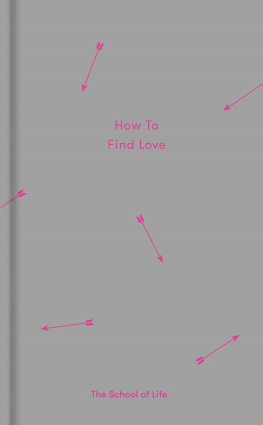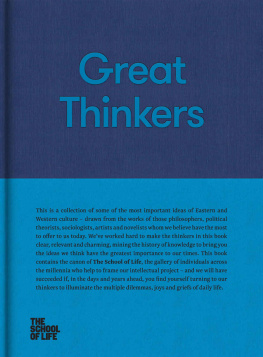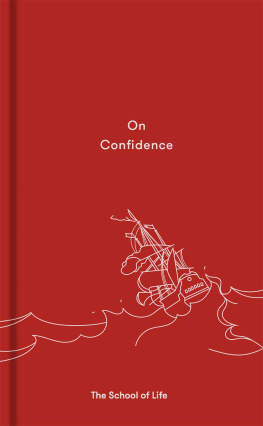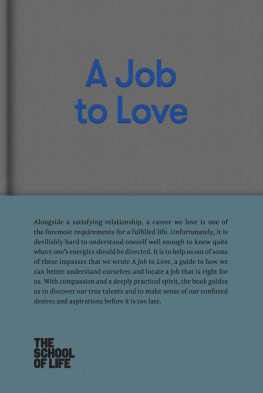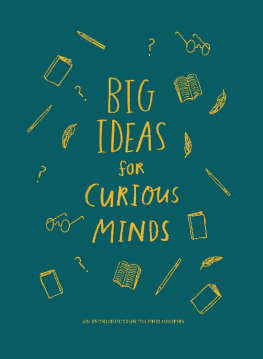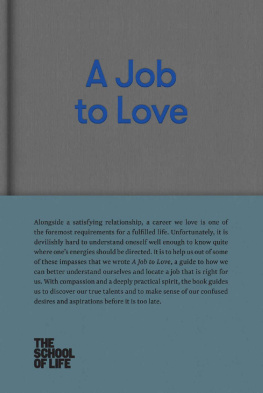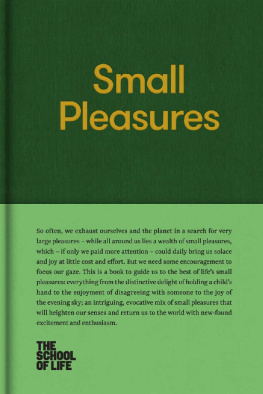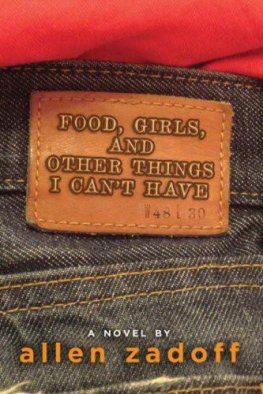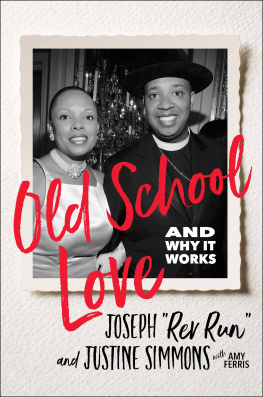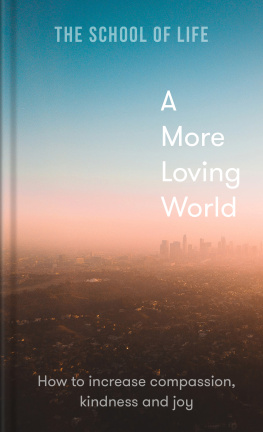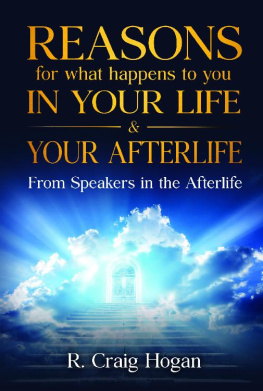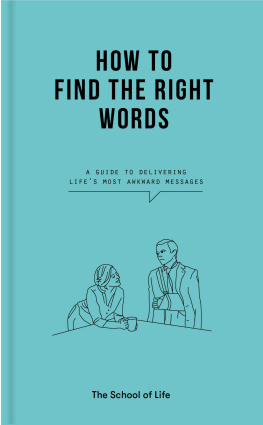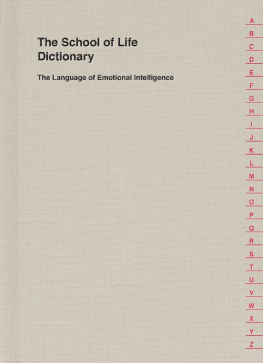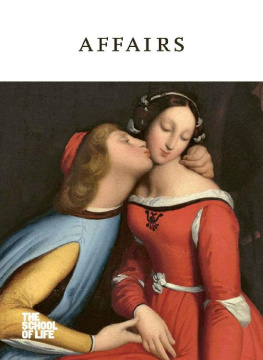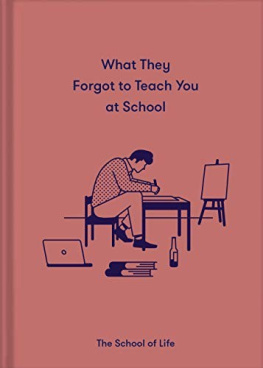The School of Life - How to Find Love
Here you can read online The School of Life - How to Find Love full text of the book (entire story) in english for free. Download pdf and epub, get meaning, cover and reviews about this ebook. year: 2017, publisher: The School of Life Press, genre: Home and family. Description of the work, (preface) as well as reviews are available. Best literature library LitArk.com created for fans of good reading and offers a wide selection of genres:
Romance novel
Science fiction
Adventure
Detective
Science
History
Home and family
Prose
Art
Politics
Computer
Non-fiction
Religion
Business
Children
Humor
Choose a favorite category and find really read worthwhile books. Enjoy immersion in the world of imagination, feel the emotions of the characters or learn something new for yourself, make an fascinating discovery.
- Book:How to Find Love
- Author:
- Publisher:The School of Life Press
- Genre:
- Year:2017
- Rating:4 / 5
- Favourites:Add to favourites
- Your mark:
- 80
- 1
- 2
- 3
- 4
- 5
How to Find Love: summary, description and annotation
We offer to read an annotation, description, summary or preface (depends on what the author of the book "How to Find Love" wrote himself). If you haven't found the necessary information about the book — write in the comments, we will try to find it.
How to Find Love — read online for free the complete book (whole text) full work
Below is the text of the book, divided by pages. System saving the place of the last page read, allows you to conveniently read the book "How to Find Love" online for free, without having to search again every time where you left off. Put a bookmark, and you can go to the page where you finished reading at any time.
Font size:
Interval:
Bookmark:
How to
Find Love
Other books in this series:
Why You Will Marry the Wrong Person
On Confidence
Why We Hate Cheap Things
Self-Knowledge
The Sorrows of Work
The Sorrows of Love
How to
Find Love
Published in 2017 by The School of Life
70 Marchmont Street, London WC1N 1AB
Copyright The School of Life 2017
Designed and typeset by Marcia Mihotich
Printed in Latvia by Livonia Print
All rights reserved. This book is sold subject to the condition that it shall not be resold, lent, hired out or otherwise circulated without express prior consent of the publisher.
A proportion of this book has appeared online at
thebookoflife.org
Every effort has been made to contact the copyright holders of the material reproduced in this book. If any have been inadvertently overlooked, the publisher will be pleased to make restitution at the earliest opportunity.
The School of Life offers programmes, publications and services to assist modern individuals in their quest to live more engaged and meaningful lives. Weve also developed a collection of content-rich, design-led retail products to promote useful insights and ideas from culture.
www.theschooloflife.com
ISBN 978-1-9997471-3-8
Contents
I
Introduction: From Reason to Instinct
II
Why We Fall in Love with Particular People
III
Our Problems With the People We Are Attracted To
IV
Improving Our Problematic Instincts
V
Obstacles to Finding Love
VI
Conclusion: Realism
Introduction: From Reason to Instinct
We should feel sympathy for ourselves. The challenges of finding love are highly complex, seldom systematically explored, and relatively new. We have been looking for love the way we do now for, at best, only 260 years. We are still at the dawn of determining how to get into good relationships. Signs of our missteps are all around us.
For most of history, relationships were very different in two main ways. Firstly, people didnt marry for love. They did so for reasons of status, money, household skills and beauty. We didnt expect to love our partners; we hoped at best to tolerate them. We made Marriages of Reason. Secondly, we didnt have to find our partners ourselves. The task of locating a spouse was left to our families or society more broadly. We would wait to be presented with options vetted for us according to objective criteria.
Then, in the middle of the 18th century in Europe, a revolution of ideas began that has now spread around the world; a movement known to us today as Romanticism. Romanticism declared that the only real foundation for a relationship was an intense bond of love. All practical considerations (heirs, status, property) were deemed either negligible or irrelevant. The Marriage of Reason gave way to the Marriage of Feeling. We were now left to choose our own partners, without reference to the wishes of anyone else, be it family or society. The ideal lover was to be found by Instinct, not by Reason.
The idea of following an Instinct took on an enormous role in the story of love. Far from being a passing folly, the feeling of being in love was now interpreted as a supremely reliable guide to half a century or more of conjugal happiness. The arrival of this feeling was understood to be a little mysterious: one couldnt predict it, justify it, or wish it to occur at will. It would simply descend upon us in the presence of certain people for reasons that lay outside conscious understanding. It had elements in common with a religious visitation. One would become aware of a variety of symptoms, amply described in literature and art: a quickened heartbeat, a sense of having alighted on The One, difficulty sleeping, an urge to speak (to almost everyone) about the beloved and a desire to listen to music and go into nature, together with The One.
Romanticisms faith in the power of instinctive attraction has been touching and at points exhilarating, but it has also proved enormously problematic. In comparison with the hopes we harbour of love, the way most of our lives turn out can appear extremely disappointing. When we take into account the statistics on marital unhappiness and divorce, we must conclude that raw instinct alone cannot be judged an especially reliable method of locating the right partner. Our belief in instinct has been no friend of our chances of happiness. We cant go back to the Marriage of Reason, but we may need to look for a future beyond the Relationship of Instinct. At The School of Life, we anticipate and are trying to create tools for what we call a Psychological Relationship: a union where the best insights of psychology are brought to bear on the complex business of finding and maintaining love.
Why We Fall in Love With Particular People
It is tempting to describe our instinctive attractions to particular people as simply mysterious. It feels, as we put it tellingly, Romantic not to analyse our feelings, and merely to follow their dictates with awe and abandon.
However, our feelings are not the mysterious yet intelligent lodestars we might wish them to be. They are, for the most part, plainly misleading. A sense of being in love with someone is seldom a prelude to long-term contentment. If we intend to get better at relationships, we must attempt to examine the calls of Romantic love rationally. This isnt a question of abandoning instinct, but of improving upon it.
The most notable aspect of our instinct in love is its particularity. We arent capable of falling in love with just anyone; we are powerfully led by our types. We may reject many good candidates who, on paper, could sound perfect. We may not be able to explain much more about their inadequacies other than to say weakly that they didnt feel right. Alternatively, we can be powerfully impelled towards other candidates, this time less clearly suitable, for reasons wholly beyond our conscious command. We are extremely, fascinatingly choosy.
Why, then, do we fall in love with particular people and not others? Why do we have the types we do? What guides our attractions? We can identify three components:
An instinct for completion
One of the most powerful forces within love is the Instinct for Completion. All of us are radically incomplete: we lack a range of qualities in our characters, psychological but also physical. We might be missing calm, creativity, practical know-how, wit, strength or sensitivity. It is as if, somewhere within us, we recognise this incompleteness and experience an attraction whenever we enter the orbit of someone who possesses a complementary quality. Through love, we seek to make good a defect and to complete ourselves.
As all of us have very different kinds of incompleteness, it stands to reason that we will find very different people attractive. Certain candidates will have qualities that leave us cold, because we have these in spades already: we may not need, for example, someone who is as calm as we are. Things would threaten to get dangerously quiet. We might need an injection of creativity and irreverence instead. Our tastes will be as varied as our deficiencies.
This mechanism of attraction in love is similar to the mechanism of attraction we have around styles of architecture and design. When it comes to buildings and interiors, we also operate with an instinct for completion. The places we call beautiful (like the people we call attractive) are often those that have qualities we want but dont yet have enough of. Consider these two very different buildings (right). We are most likely to be drawn to one or the other on the basis of a quality we dont feel we possess enough of in ourselves. People who feel a painful lack of exuberance, drama and extravagance, and are overwhelmed by drabness and sobriety might be drawn to Viennas Peterskirche. Those who feel an anxious lack of calm, coherence and serenity, and have too much chaos, activity and intensity, might feel moved by the simplicity of the St. Moritz Church in Augsburg.
Next pageFont size:
Interval:
Bookmark:
Similar books «How to Find Love»
Look at similar books to How to Find Love. We have selected literature similar in name and meaning in the hope of providing readers with more options to find new, interesting, not yet read works.
Discussion, reviews of the book How to Find Love and just readers' own opinions. Leave your comments, write what you think about the work, its meaning or the main characters. Specify what exactly you liked and what you didn't like, and why you think so.

